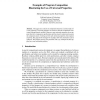Free Online Productivity Tools
i2Speak
i2Symbol
i2OCR
iTex2Img
iWeb2Print
iWeb2Shot
i2Type
iPdf2Split
iPdf2Merge
i2Bopomofo
i2Arabic
i2Style
i2Image
i2PDF
iLatex2Rtf
Sci2ools
104
click to vote
IPPS
1999
IEEE
1999
IEEE
Examples of Program Composition Illustrating the Use of Universal Properties
Abstract. This paper uses a theory of composition based on existential and universal properties. Universal properties are useful to describe components interactions through shared variables. However, some universal properties do not appear directly in components specifications and they must be constructed to prove the composed system. Coming up with such universal properties often requires creativity. The paper shows through two examples how this construction can be achieved. The principle used is first presented with a toy example and then applied to a more substantial problem.
Components Interactions | Distributed And Parallel Computing | IPPS 1999 | Shared Variables | Universal Properties |
Related Content
| Added | 03 Aug 2010 |
| Updated | 03 Aug 2010 |
| Type | Conference |
| Year | 1999 |
| Where | IPPS |
| Authors | Michel Charpentier, K. Mani Chandy |
Comments (0)

